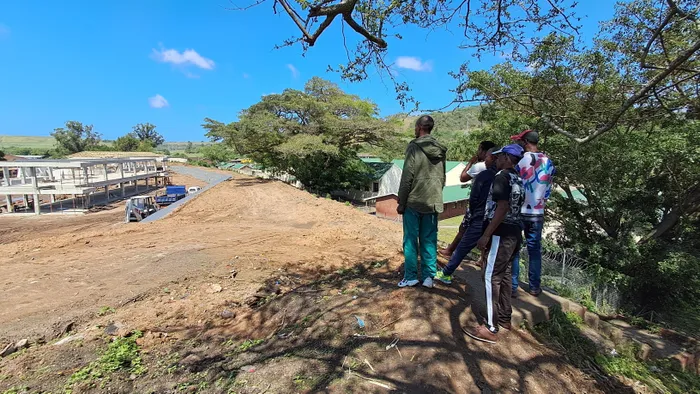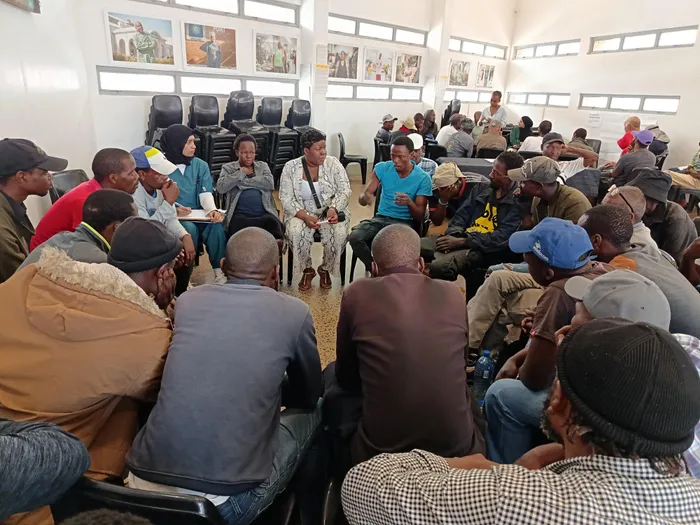On World Homeless Day, shouldn't we at least listen to the homeless

A group of homeless men view the Sakithemba project in Lower Illovo, which many fear will be an expensive white elephant.
Image: Supplied
The problem of homelessness in central Durban is a pressing one. At the Denis Hurley Centre we know this better than most, since we are the single largest provider of services to homeless people in the city. And it cannot be successfully addressed without listening to the people closest to the problem.
The municipality, having ignored the issue for many years, finally started taking it seriously with COVID. Indeed, during the lockdown, the efforts of eThekwini, working closely with NGOs, the faith community and businesses, were the envy of other metros. One of the reasons was that the municipality actually listened to the homeless people they were trying to help and the organisations who accompany them.
Scroll forwards five years and it seems that they have forgotten how to listen. The much-vaunted plan by eThekwini to create a homeless shelter for 800 people in Lower Illovo – on which they are spending at least R10 million just for construction – has been devised despite zero consultation with homeless people themselves. They have also refused to listen to the views of any of the NGOs in the homeless sector (apart from the few captive ones that just nod meekly). And they have failed to see if the National Homeless Network can provide any useful lessons from other parts of South Africa.
If they had asked, they would have learnt about the millions of rand wasted by the City of Cape Town when they tried to create a massive shelter, far from the city centre and then force people to move to it. Predictably, the homeless detainees all moved away as soon as they could. That disaster taught three important lessons: don’t try to impose large-scale solutions on human-sized problems; don’t try to put people where they don’t want to be; and don’t make promises that you have no intention or capacity to honour.

A group of homeless people are consulted at the Denis Hurley Centre on their needs.
Image: Supplied
But the Sakithemba project in Lower Illovo, edging towards completion, makes all those mistakes. First of all, it aims to accommodate 800 people. This is much larger than the ‘rule of 100’ that best practice says should be the standard, unless you intend to treat people as if they were in a prison. (And let’s leave aside that 800 is only 5% of the homeless people that the municipality’s own numbers claim to be in Durban.)
Moreover, it is located 37km away from the city centre. We took some homeless men to see it recently. They were shocked by how long the drive was, thinking how many days it would take them if they had to walk back. They all concluded: “This is a dumping ground!”.
Interestingly, when I challenged someone from the office of the Deputy Mayor about the lack of consultation, he started showing me photos of a meeting that was held with local residents. This was actually held after the plans had been made – so less of a consultation and more of a damage limitation – and anyway locals are not happy. Perhaps the fact that the site is right next door to the local primary school, and opposite a business park, might be reasons. But it is disappointing that a political party that claims to care for the poor thinks that consultation applies only to angry rate-payers and not to other people directly affected.
So as part of yesterday’s ‘World Homeless Day’, the Denis Hurley Centre ran a consultation exercise to assist the municipality and we are not even charging them. The 100+ homeless men and women who attended were pleased that someone was finally asking their opinions.
First of all, they could not understand why the municipality, with so many empty buildings in the middle of the city, would spend money building something new so far away. Or perhaps they did understand and are fearful of what the underlying strategy might be. Their fears were compounded when they started worrying how the locals would react to their intrusion into a small tight-knit community. As one homeless man commented: “When they put the Jews into the trains to take them far away to the concentration camps, they were told that this would be for their own good.”
The homeless men and women did understand that the municipality could not force them to move to this place, or force them to stay there. After all, penal workhouses for the poor ended with Queen Victoria. So we asked them what would actually persuade them to take up the municipality’s invitation to move to Lower Illovo. Most of them had experienced the tented safe sleeping spaces run by eThekwini since COVID: so they knew what the municipality had been doing and also were aware of the gaps between what was promised and what was delivered.
“We will need 2 or 3 meals a day” – but they added that the food they get in town is not from the municipality but from NGOs, and there were none based in Lower Illovo.
“Training programmes” – but then one man shared about a 14-month training programme he attended with 26 others run by eThekwini after which not one of them got a job.
“Sanitation and hygiene” – but they have seen how poorly eThekwini has run the toilets and showers at the sites in the centre of town.
“Social workers who care about us and can help us” – but they pointed out that the only social workers the municipality sends to help them at the moment are unqualified and unsupervised students who spend all their time on their phones.
And the biggest need – free travel to and from other services, since there are none at all in Lower Illovo. “At least in town, if there is work or if we need go to go a clinic or Home Affairs, we can walk there.”
The Mayor is due to launch a ‘Multi-Sectoral Technical Task Team’ to address homelessness. If he wants to give the Sakithemba shelter some chance of succeeding – even though its size and its location make that unlikely – we are happy to share with him some useful insights from the homeless people he wants to help. But if he just wants to create an expensive dumping ground as a scapegoat, to avoid having to manage the problem meaningfully, I’m afraid the homeless of Durban have already seen through your plan. Pretty soon, so will the rest of Durban – ratepayers, business owners, faith leaders and politicians.
So, Mr Mayor, do the right thing. Not just because it is election year next year, but because you too understand the importance of that old slogan when we fought for democracy: Nothing About us, Without us!
- Dr Raymond Perrier is the Director of the Denis Hurley Centre in Durban and the Chair of the National Homeless Network